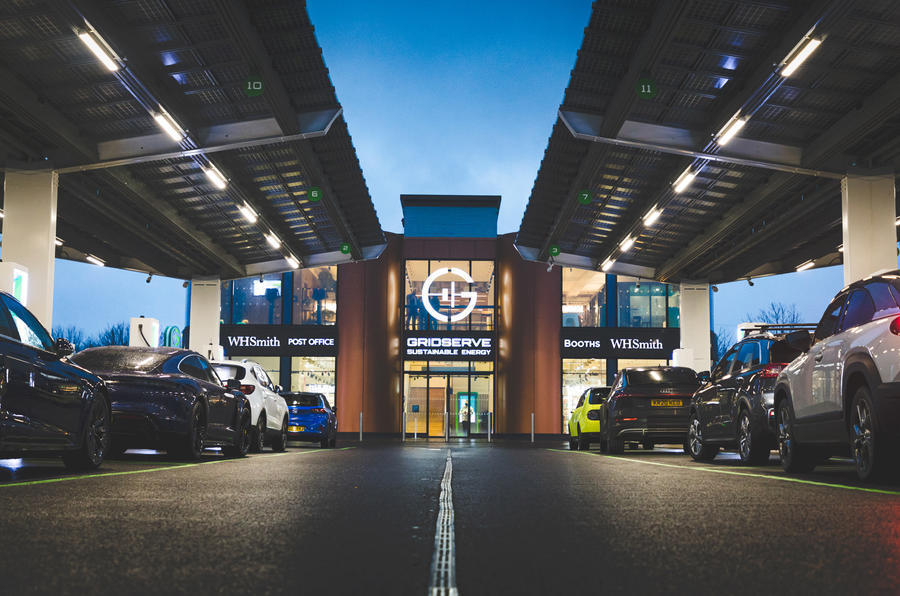Sustainable energy firm Gridserve has begun to upgrade its EV charging network, with major infrastructure developments including 11 new EV hubs and two new electric forecourts.
Construction is underway on the two EV forecourts which are due to open in 2022. One will be situated near Norwich and will open in April 2022, while the other will open at Gatwick Airport in autumn 2022.
The facilities are part of what Gridserve has called the “biggest motorway EV charging upgrade in UK history” and follow on from its acquisition of Ecotricity’s Electric Highway network earlier this year.
The upgrades include the addition of more than 20 EV hubs in total across the country, each with between six and 12 350kW chargers and contactless payment. Most of the hubs are planned to be installed by the end of March 2022.
“Our mission is to deliver sustainable energy and move the needle on climate change, and that's exactly what we are doing,” said Gridserve CEO Toddington Harper.
“Getting people into electric vehicles is a big part of our vision, but to do that, charging has to be simple and free of anxiety, which is why we’ve designed our network entirely around the needs of drivers."
Harper also suggested that the forecourts will help give customers the confidence to move to electric cars eight years ahead of the UK's 2030 ban on new ICE cars.
The Gatwick forecourt will be situated on the southern approach to the airport’s south terminal, adjacent to the M23. It forms a part of Gatwick’s 2040 target for net-zero emissions from its internal operations.
It will be the first forecourt of its kind to be located at an international airport and will allow up to 36 EVs at a time, with multiple connector types that are said to be compatible with all types of electric car.
“We're on a journey to create a low-carbon economy, and Gatwick is keen to play an important role by providing new infrastructure that everyone can use so that together we can start reducing our dependence on fossil fuels,” said Jonathan Pollard, Gatwick’s chief commercial officer.
Pollard said the new facility will contribute to a stronger EV charging infrastructure at the airport, supporting the growing number of passengers who own EVs.
“The new charging infrastructure will also benefit people right across our community, including thousands of staff who live locally, businesses looking to introduce electric vehicle fleets – even those operating busses and trucks – and also local residents who may be considering buying an electric-powered car but were undecided due to the lack of charging facilities,” Pollard said.












Join the debate
Add your comment
What is EV owners really need are hubs on the motorway and major trunk road network. Gridserve have replaced a lot of the old unreliable Ecotricity units but no extra capacity at most sites. The increase in number of EVs, particularly this year, has led to chronic queuing at many MSA's. With the possible exception of Gatwick the new hubs are off the beaten track and are designed to serve local communities where EV owners may not have off-road charging facilities at home. This is a different investment model to rapid charging required when on longer trips.
What is EV owners really need are hubs on the motorway and major trunk road network. Gridserve have replaced a lot of the old unreliable Ecotricity units but no extra capacity at most sites. The increase in number of EVs, particularly this year, has led to chronic queuing at many MSA's. With the possible exception of Gatwick the new hubs are off the beaten track and are designed to serve local communities where EV owners may not have off-road charging facilities at home. This is a different investment model to rapid charging required when on longer trips.
I agree that something more like a filling station model is how EV charging will end up for the majority of people, but Gredserve is a business and it's mission is to make money for the investors. It makes me brissle when I read "Our mission is to deliver sustainable energy and move the needle on climate change." What are they doing to ensure the electricity they serve is sustainable? What else are they doing? Are they comitting to minimum profits to ensure affordable pricing that helps accelerate the adoption of electric vehicles and deliver their mission?